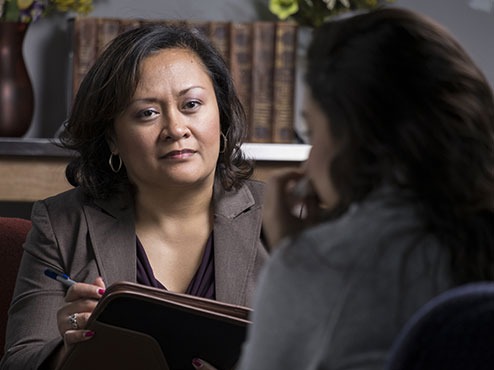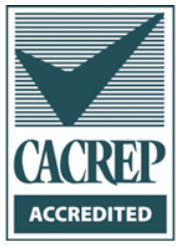As the severity of the COVID-19 pandemic begins to ease, counseling professionals will find that they are needed more than ever before to help those struggling with addiction.
Develop skills to help people: Master’s in addictions counseling
The CACREP-accredited MS in Professional Counseling: Addictions Counseling Track will train you to work with adults and adolescents experiencing one or more addictions (alcohol, prescription drugs or illicit drugs) in a variety of community settings, including addiction/recovery centers, community mental health centers, hospitals and employee assistance programs.
The program is designed to transition you into a career in professional counseling and prepare you to become a licensed professional counselor (LPC) in the state of Pennsylvania.
Additionally, this degree enables you to earn 180 hours of required addiction-specific coursework toward becoming a PA certified Advanced Alcohol and Drug Counselor (CAADC).

Credits required:
60 credits
Cost per credit:
$1,046/credit
Time to degree:
2.5 – 3.5 years
Delivery:
On campus
Scholarship Information
The Addiction Counseling Workforce Impact Project (AC-WIP) is designed to increase the number of master’s level Professional Counselors who specialize and are certified in Addictions Counseling to serve the citizens of Pennsylvania while increasing the awareness and education of community members and professionals. Students enrolled the MS Professional Counseling degree program are eligible for up to $27,600 in scholarship funding and $4,400 in stipends.
AC-WIP Students will participate in:
- Addiction-Related Trainings
- Trainings for Community Members in Urban and Rural Communities
- NAADAC Certificate Program
- AC-WIP Addiction Counseling Symposium
- Additional funding available for professional memberships and NCE exam
For any questions,
Contact: mpc@carlow.edu
Addictions Counseling Track Curriculum
The 60-credit M.S. degree in Professional Counseling consists of 51 credits of core courses, 9 credits of Addictions Counseling electives, and 700+ clinical hours in Addictions Counseling.
PRC739 – Substance Abuse Counseling Theories & Interventions
PRC 741 – The Biological Bases of Alcohol & Other Drug Addiction
PRC 743 – Co-Occurring Disorders: Counseling Clients with Substance Abuse & Psychiatric Disorders
Post-Master’s Alcohol & Drug Counseling Certificate Only
The 12-credit graduate certificate consists of four (4) addiction-specific online courses.
PRC 738 – Introduction to Substance Abuse Counseling
PRC739 – Substance Abuse Counseling Theories & Interventions
PRC 741 – The Biological Bases of Alcohol & Other Drug Addiction
PRC 743 – Co-Occurring Disorders: Counseling Clients with Substance Abuse & Psychiatric Disorders
Courses Descriptions for the Professional Counseling Program
Quick Facts
- 2024 PCA Outstanding Counselor Education Program
- Meet educational requirements for Pennsylvania licensure in professional counseling (LPC), national counselor certification (NCC), and the PA certified Advanced Alcohol and Drug Counselor (CAADC)
- Accumulate 180 hours of addiction-specific coursework needed for Advanced Alcohol and Drug Counselor (CAADC) certification
- Degree program centered around multicultural and social justice
- Scholarships and Graduate Assistantships Available

Clinical Fieldwork Experience
“Professional practice, which includes practicum and internship, provides for the application of theory and the development of counseling skills under supervision. These experiences will provide opportunities for students to counsel clients who represent the ethnic and demographic diversity of their community.” – 2016 CACREP Standards: Section 3
During the practicum and internship experience, you will learn and practice, under supervision, a wide array of duties and responsibilities of a professional counselor who is employed at the site placement. These experiences are developmental in nature, as you grow in your competence, skills, and progress from practicum to internship experiences. Over the course of the clinical fieldwork experiences, you will complete a minimum of 700 clinical hours in Addictions Counseling.
Accelerated Masters of Professional Counseling Program
Accelerated
Fast track your way into this master’s program by taking graduate courses as a Carlow undergraduate student. Course credits count toward both degrees. If you are interested in becoming a professional counselor and you are currently a junior or senior, with a minimum of a 3.0 GPA, consider applying for the Accelerated Masters of Professional Counseling Program. You will be able to take up to four (4) graduate level courses which are held on-campus.
Graduate Course
PRC 708 Ethics and Professional Orientation
PRC 701 Human Growth and Lifespan Development
PRC 702 Social and Cultural Foundations
PRC 710 Counseling Theories
Accelerated Program – Undergraduate Prerequisite Courses
1) PY 122 Lifespan
2) PY 203 Personality Theory
3) PY 285 Intro to Counseling
4) Any additional 3 credits UG Psychology Course(s)
Contact your Carlow Faculty Advisor for details.
Career opportunities for Addiction Counselors
Employment of substance abuse and mental health counselors is projected to grow 25% from 2019 to 2029, according to the U.S. Bureau of Labor Statistics.
▸ View the Professional Licensure Disclosure for this program.
Accreditation

The Council for Accreditation of Counseling and Related Educational Programs (CACREP), a specialized accrediting body recognized by the Council for Higher Education Accreditation (CHEA), has granted accreditation to the following programs in the Department of Psychology, Counseling, and Criminology at Carlow University: Addictions Counseling and Clinical Mental Health Counseling through 2029.
The Professional Counseling Program emphasizes high standards of professional competence. The program is committed to its stated mission through ongoing accreditations by the Middle States Commission on Higher Education and the Council for Accreditation of Counseling and Related Educational Programs (CACREP). We emphasize ethical practice and keep current with state and national standards for certification and licensure for practice in clinical practice environments. In addition, we engage in ongoing program development and refinement based on accrediting bodies’ and licensure boards’ developments and recommendations, as well as sensitivity to licensure requirements, and legal and ethical issues.
Additional program information:
- Learn about the program (program description, annual report, mission statements and program objectives)
- Graduate statistics (NCE pass rates, completion rates and job placement rates)
Admission requirements and application process
Sign up for Professional Counseling Recruitment Events
If you are interested in pursuing a career in Professional Counseling by providing individual and group counseling, you can apply for free online. The graduate program admissions process happens on a rolling basis. Our students have undergraduate degrees in a wide array of disciplines from psychology, human services, social work, or other related majors to majors outside of the helping professions.
Apply by
November 1 or April 1
Start terms:
Fall & Spring
Requirements
- Baccalaureate degree from an accredited institution
- Cumulative GPA of 3.0 or higher. A GPA below 3.0 may be reviewed on a case-by-case basis if there is relevant evidence of work history in the helping field, and/or strong grades in upper-level courses (psychology, human services, social work, or other related majors).
- Evidence of work and/or volunteer experience in a helping field
- Evidence of graduate level writing skills necessary for success in a graduate program
- Ability to perform all the program’s essential standards required to practice as a professional counselor
- Ability to demonstrate professional dispositions and behaviors
Process
- Official transcripts from all degree-granting institutions you have attended. Transcripts must be sent directly to the Carlow from the institution(s).
- A written professional essay describing your professional career goals, strengths, and skills that will contribute to your success in a graduate counseling program. Additionally, discuss how you incorporate social justice and diversity in your work. If your GPAs is below 3.0, also include the factors that impacted your GPA. The essay must demonstrate evidence of graduate level writing skills. (2-page limit).
- Current resume or curriculum vitae highlighting education and professional experiences in counseling and/or related field.
- Two letters of recommendation (one from faculty member/academic source & one from employer/volunteer supervisor) that address your professional accomplishments, leadership potential, and ability to succeed in graduate-level work. The references should not be related to the applicant.
- GRE/GMAT scores are not required for admission
Transfer students can transfer up to 9 credits earned at a CACREP-accredited program. International students can find more information on our International Admissions page.
The Professional Counseling Program’s application deadline for Fall semester is April 1st and November 1st for the Spring semester. We will continue to accept applications for review beyond those deadlines; however, preference will be given to those that applied by the designed deadlines. The preferred deadline for full consideration of graduate assistantship opportunities is February 1st.
Once your completed application is received, the program faculty will review your application materials and the selected applicants will be scheduled for an interview. Incomplete applications will not be reviewed. Admission decisions include regular, provisional, and conditional admission to the program.
Professional Counseling faculty

Aniela Scanlon, PhD, LPC, NCC, ACS Assistant Professor
Contact Admissions
If you are interested in this graduate program, our Admissions team is available to help you with the next steps, including scheduling an on-campus visit or attending an upcoming event.






